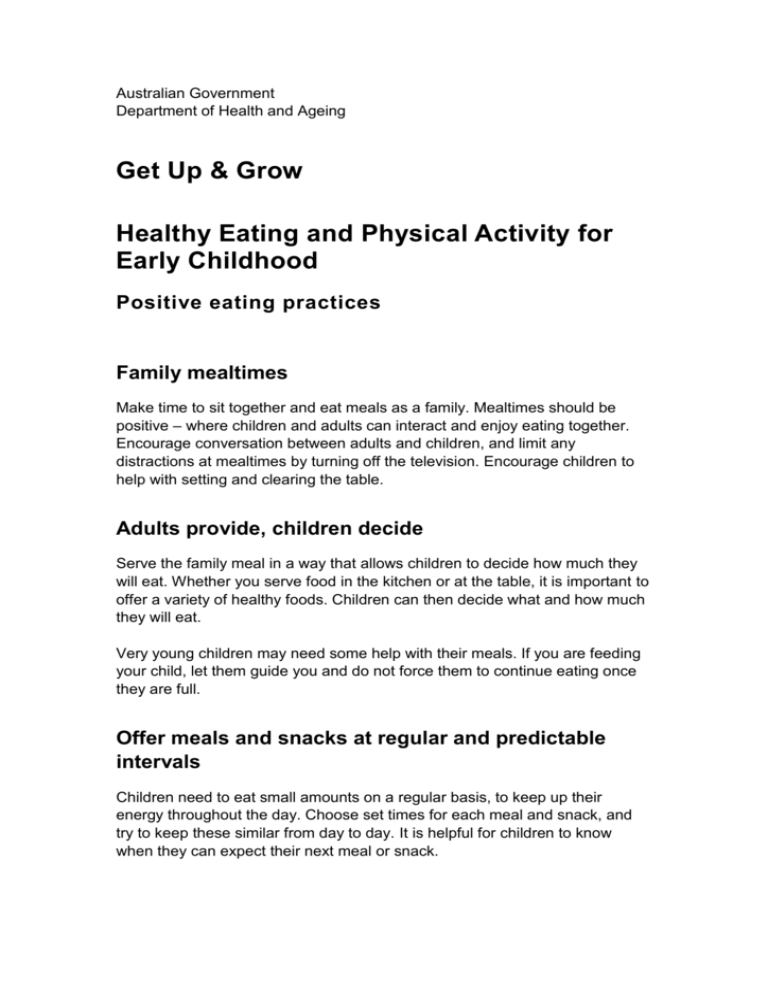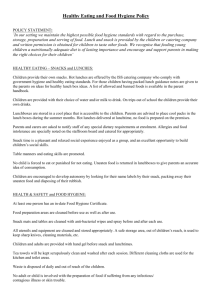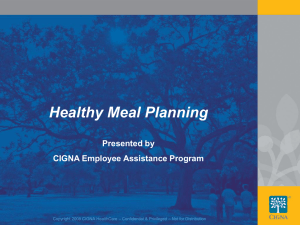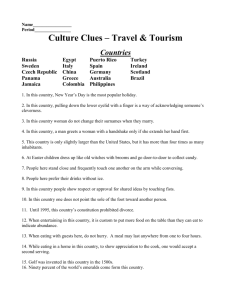Get Up and Grow - Healthy Eating and Physical Activity for Early
advertisement

Australian Government Department of Health and Ageing Get Up & Grow Healthy Eating and Physical Activity for Early Childhood Positive eating practices Family mealtimes Make time to sit together and eat meals as a family. Mealtimes should be positive – where children and adults can interact and enjoy eating together. Encourage conversation between adults and children, and limit any distractions at mealtimes by turning off the television. Encourage children to help with setting and clearing the table. Adults provide, children decide Serve the family meal in a way that allows children to decide how much they will eat. Whether you serve food in the kitchen or at the table, it is important to offer a variety of healthy foods. Children can then decide what and how much they will eat. Very young children may need some help with their meals. If you are feeding your child, let them guide you and do not force them to continue eating once they are full. Offer meals and snacks at regular and predictable intervals Children need to eat small amounts on a regular basis, to keep up their energy throughout the day. Choose set times for each meal and snack, and try to keep these similar from day to day. It is helpful for children to know when they can expect their next meal or snack. Be flexible with snack times if you need to. Allow children to pack up the activity they are doing before washing their hands and coming to the table. This way, they are less likely to be distracted and more likely to be interested in the food you have prepared. Avoid constant grazing throughout the day. This interferes with children learning to recognise when they are hungry, and eating in response to hunger. The role of adults Adults are role models. Children learn a lot from watching and listening to what goes on around them. By sitting with children at mealtimes and encouraging healthy behaviours, parents can support children’s healthy eating habits. Some things to keep in mind: • Sit with your child during meal and snack times. • Eat the same foods as your child. • Encourage your child to taste all types of food offered. • Allow your child to choose what and how much they eat from what is available. • Allow your child to serve themselves. • Never give or deny food as a reward or punishment. Fussy eating Toddlers grow at a slower rate than babies and have irregular appetites. As a result, they can be fussy about food preferences. Some older, preschool-aged children may also be ‘picky’ eaters. It is important that adults do not make a fuss over eating, as this places extra focus on food and can make the situation worse. If your child is a fussy eater: • Make sure they have not filled up on drinks or ‘discretionary choices’ before a meal or snack. • Maintain a regular mealtime routine. • Make mealtimes enjoyable and not stressful. • Don’t bribe or punish a child who refuses to eat. • Ensure that you and other adults are modelling appropriate eating behaviours. • Continue to offer foods that have been refused previously. Sometimes children need to be exposed to a new food a few times before it becomes familiar. • Offer new foods along with familiar foods. • Set a time limit of 20 to 30 minutes for a meal. After this time, remove any uneaten food and let the child leave the table. Do not offer alternative food or drinks until the next planned meal or snack. For more information Raising Children Network Website











